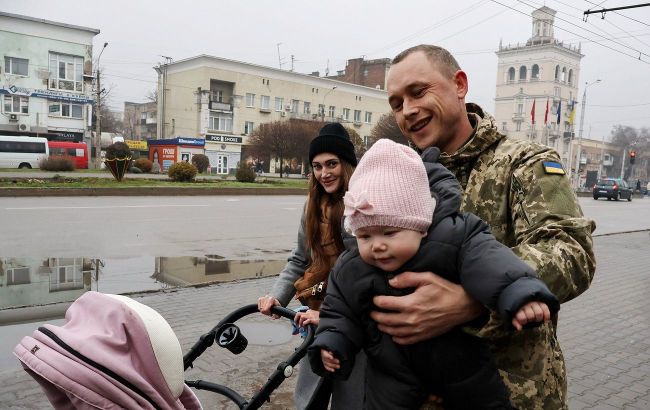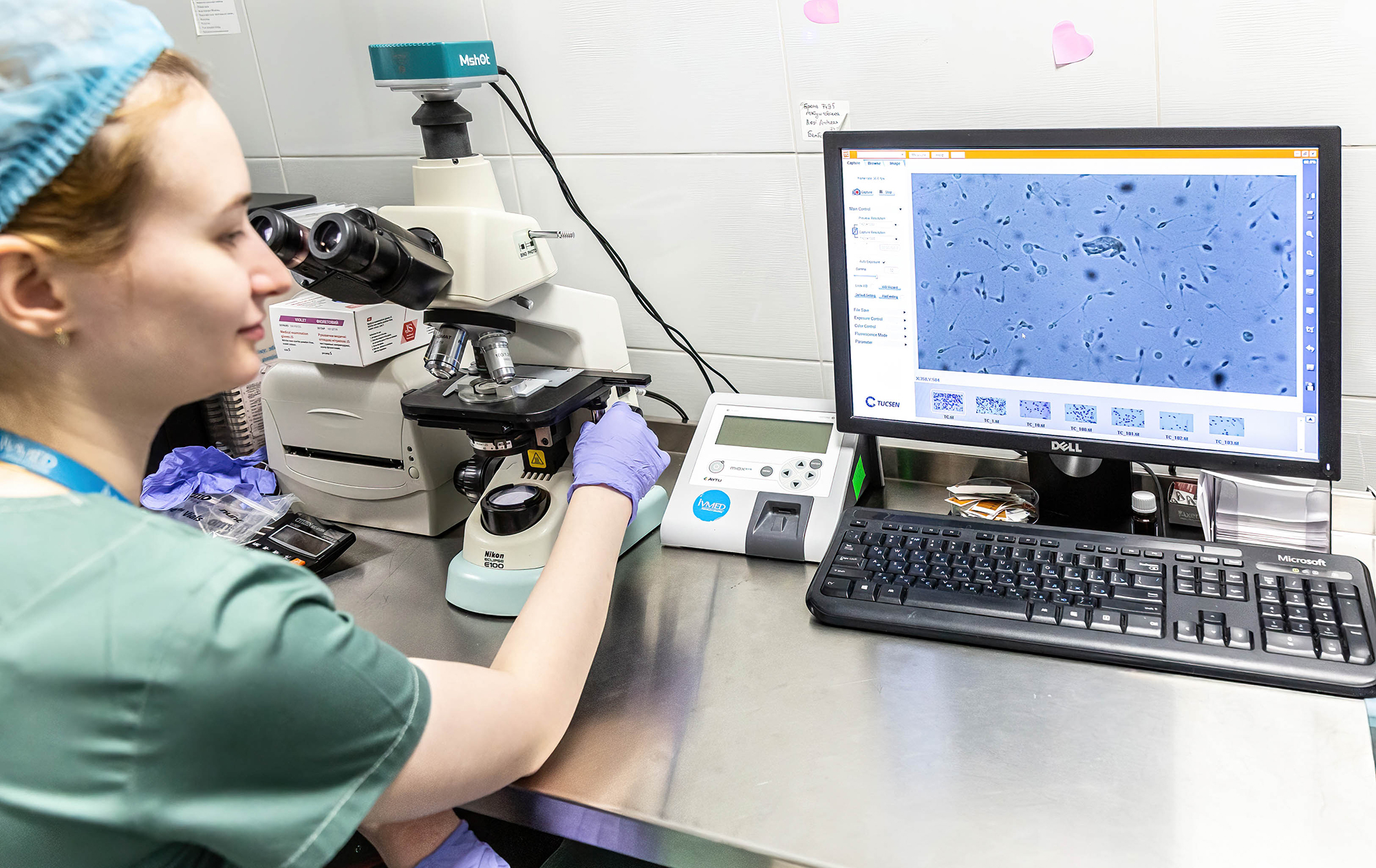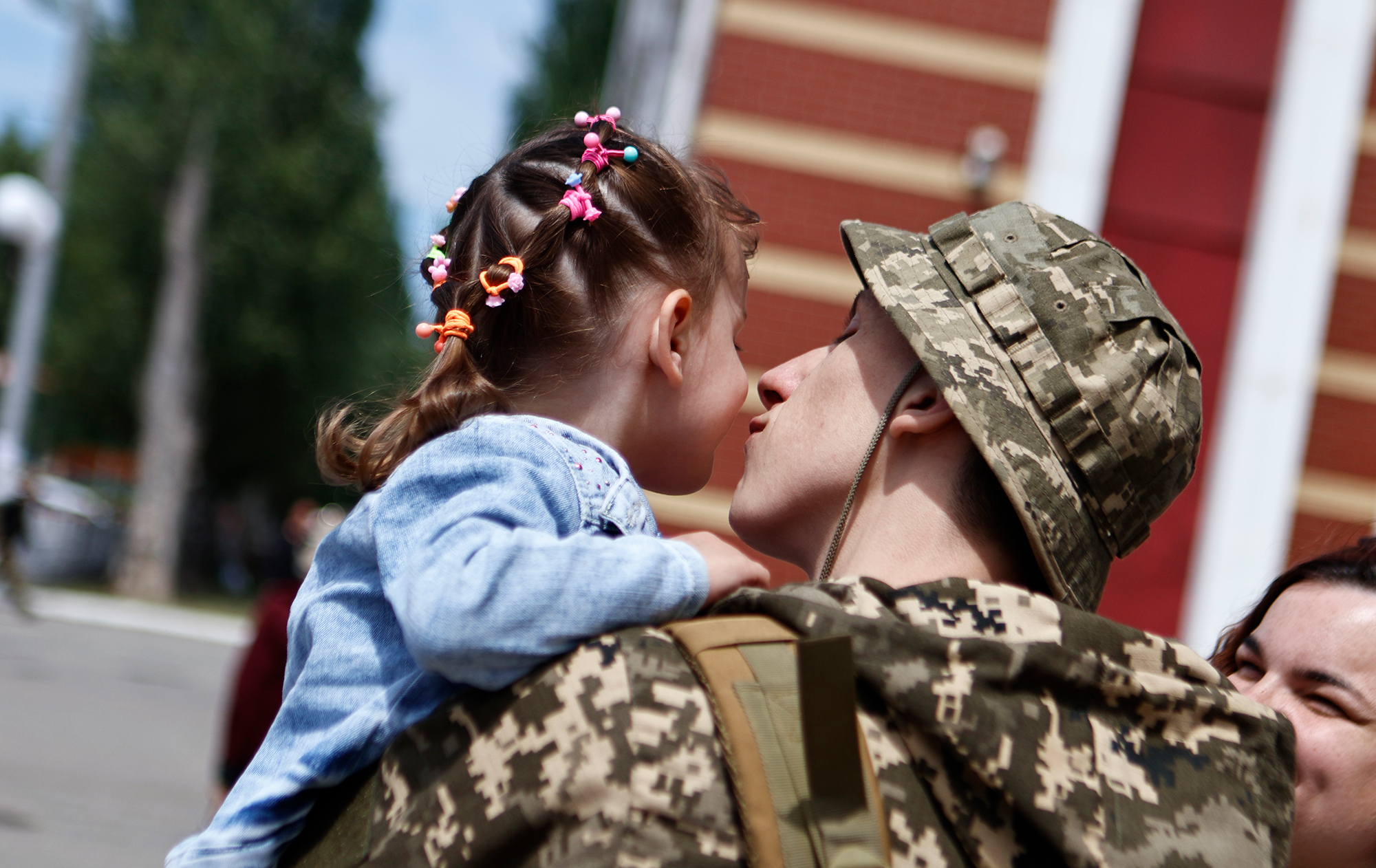Chance for parenthood: Scandal over Ukrainian military reproductive material revealed
 Ukrainian soldier with his daughter and wife on the street in Zaporizhzhia (Photo: Getty Images)
Ukrainian soldier with his daughter and wife on the street in Zaporizhzhia (Photo: Getty Images)
A scandal has erupted in Ukraine over a law that effectively prohibits women from using the frozen biomaterial of their deceased military husbands for fertilization. The controversial amendment is promised to be canceled. What happened, and whether there will be a chance for military personnel to become parents – read in the material by RBC-Ukraine.
The material includes information from the website of the Verkhovna Rada of Ukraine, comments from lawyer Olena Babich, the leading reproductive specialist at ICSI Clinic Oleksandr Darii, the medical director of the Grischenko Academy Clinic "Rid" Ksenia Khazhylenko, as well as insights from the family of a Ukrainian serviceman.
In November 2023, the Verkhovna Rada approved a law on storing the reproductive cells of military personnel. It aimed to regulate the possibility of free retrieval, cryopreservation, and storage of their germ cells. This would give them a chance to become biological
When the law was passed, it didn't attract much attention, but later, a scandal erupted around it. Lawyer Olena Babich shared a story about how a military widow was processing documents to use her deceased husband's sperm to conceive a desired child. However, according to the adopted law, doing so after the defender's death is prohibited: clinics must dispose of the biomaterial from March onwards. The prohibition clause surprised many because the law primarily relates to funding and ensuring the rights of defenders to biological parenthood.
"How to explain to a woman who was processing documents with her husband a couple of months ago to give birth to a child that while her husband was defending the country and died, our legislators deprived him of the right to be a father after his death?" reflects the lawyer.
On the same day, the bill's author, MP from the "Servant of the People" party Oksana Dmytrieva, responded to the story. According to her, the initial draft prepared for the first reading did not contain provisions on disposal, and she and her colleagues were against such norms. An amendment on disposal was introduced for the second reading by the chairman of the Parliamentary Committee on Public Health, Medical Assistance, and Medical Insurance, Mykhailo Radutskyi. When the issue went public and received criticism, he said, "they will remove this problem by March."
The discussions surrounding the law and whether military personnel will be able to exercise the right to have children after injuries and even after death are further explored in the material.

Photo: The legislative framework for the use of biomaterial by the military is promised to be regulated (Getty Images)
Chance of parenthood after injuries
Kyiv residents Oksana and Viktor got married a year before the full-scale invasion of Russia into Ukraine. They had considered having children earlier, but the war hindered their plans. The family decided to freeze Viktor's sperm, as he is currently defending his homeland: who knows what will happen tomorrow and whether he will remain alive. Viktor has a medical background but later got involved in business. In the early days, he volunteered for the war.
"My husband went to war not for money; he earned more in civilian life. He came to me and said that defending the country is his duty, especially since he is a doctor. Of course, I was afraid and worried. But I understood his decision and shared his thoughts. Last year, we turned to one of the clinics and preserved reproductive cells to have the opportunity to have a child together in the future. It's a well-considered conscious decision," says Oksana to RBC-Ukraine.
The cryopreservation of biomaterial from men and women is a routine task for assisted reproductive technology clinics. During the war, practically all major clinics of this profile began offering these services to military families for free or with significant discounts.
"I would like to continue my family line. Even if something happens to me," shares Viktor, Oksana's husband. "Many men who go to war psychologically need to know that even after their death, they will have children. This idea will support and motivate the military. Otherwise, they die and leave nothing behind. If the wife wants the same, and this moment is thought out in advance, why not realize this right?"
Military personnel on the front lines may suffer injuries that affect their reproductive capabilities, emphasize doctors. The problem can be particularly serious for those who do not yet have children but want to become parents. In 2022, the initiative for free sperm storage for Ukrainian military personnel in specialized reproduction clinics emerged.
.jpg)
Photo: Most clinics offer germ cell storage to the military for free or with significant discounts (provided by ICSI Clinic)
"At that time, we understood that a legislative solution would not be quickly adopted at the state level, so we decided to provide such services to military families voluntarily and free of charge. This was done by practically all major assisted reproductive technology clinics in Ukraine," says Oleksandr Darii, a leading reproductive specialist at ICSI Clinic and an honored doctor of Ukraine, to RBC-Ukraine.
Recently, an increasing number of military personnel who want to preserve their reproductive material are turning to clinics across Ukraine. According to Darii's estimates, while there were dozens of people in the first year of the major war, now each clinic deals with at least several hundred cases.
However, many clinics were prepared for larger-scale storage of biomaterial. According to RBC-Ukraine, one of the specialized institutions had previously approached the Ministry of Health and the Ministry of Defense about the possibility of freezing reproductive cells for free. However, cooperation did not materialize at that time.
"During the war, there are many other urgent issues," say representatives of the clinic. However, doctors are confident that this issue will need to be addressed at the state level sooner or later. And now, it is being discussed again – not only within professional circles but in the public domain.
Establishing the rules of the game
According to the adopted law, Ukrainian defenders will be able to become biological parents even if they lose their reproductive functions due to injuries on the front lines. The changes apply to those involved in combat operations and police officers, emergency services personnel, and others. However, an amendment was made to the law before the second reading, stating that clinics must dispose of biomaterial in the event of a military member's death.
In a conversation with RBC-Ukraine, lawyer Olena Babich, whose Facebook post sparked widespread discussion, expresses surprise at why this suddenly appeared in the law. After all, the draft law had been under consideration for several years, primarily related to financing biomaterial storage. Now, it turns out that widows will not be able to have children from their deceased husbands.
"Every law should solve a particular problem, not create obstacles. And here, it seems to be the complete opposite. Why do this – I don't understand. And why did our legislator decide to mention this and take the easiest path – simply to prohibit," she says.
MP and author of the law, Oksana Dmytrieva, says there was a discussion about posthumous parenthood during the preparation of the draft law. Still, they decided not to include provisions for disposal. She reassures that sub-legal acts and procedures have yet to be developed, and the program has yet to start operating. The controversial amendment should only apply to those who store cells within a program that is not yet operational.
"I am also submitting a separate bill to repeal this inhumane norm. With public support, we can quickly fix these rules. So that every male and female defender has the right to continue their lineage!" the MP noted on her Facebook.
The Ministry of Health also responded, stating that cryobanks would not dispose of the frozen material of deceased defenders.

Photo: Doctors emphasize that soldiers on the frontline may suffer injuries that will affect their reproductive capabilities (Getty Images)
The initiator of the controversial amendment, MP Mykhailo Radutskyi, has now taken a different position. He states that if families of heroes have problems with preserving biological material that may be destroyed, this issue will definitely be resolved by March. "The Verkhovna Rada will vote without hesitation for the necessary changes, including to the Civil Code and other laws," promises Radutskyi. Considering the numerous requests from journalists, he formulates the main changes.
"First and foremost: the reproductive cells of Ukrainian defenders, in the event of their death, will not be disposed of. Second: the adopted bill 3496-IX applies exclusively to military personnel who, due to injury, have lost the ability to have children, not to deceased soldiers. Third: introducing relevant amendments had a purely procedural nature to avoid contradictions with Article 248 of the Civil Code, which provides for the termination of representation by proxy after the principal's death. Fourth: there are currently no legal grounds for disposal. The law has not come into force. Fifth: to resolve this collision by March 23, 2024 (the date the bill comes into effect), the Verkhovna Rada will adopt changes to the Civil Code that take into account the interests of families of deceased soldiers," explained the committee chairman on social media.
The storage of reproductive cells is a medical procedure with its peculiarities. However, Olena Babich believes that there was not a significant problem with funding the conservation and storage of sperm itself: most Ukrainian clinics provided this service for free. But the war has introduced corrections, making the issue very urgent and requiring a solution.
The funding point is still important, according to Oleksandr Darii. Currently, there are funds and opportunities to preserve biomaterial, but tomorrow, there may be no resources. On the legislative level, doctors call for specifying who will pay – the family, the state, or the clinics. This will establish clear rules that everyone will follow – both clinics and the families of military personnel. Currently, everything is essentially based on the initiative of the industry itself.
"There are funds, but today they have resources, and tomorrow they may not. Reproductive clinics are happy to help, and today, we are talking about hundreds of military personnel in each clinic. But if tomorrow, hypothetically, an entire unit comes to donate sperm, as it happens in Israel? There, it is clearly stated that the state covers all the costs for the military," he expresses his opinion.
Earlier, cryopreservation of reproductive cells in Ukraine was regulated by Order No. 787 of 2013. It did not include distinctions between "military/non-military" or mentions of posthumous reproduction. However, the document did not prohibit such use of biomaterial. The new amendment is a direct ban, says Ksenia Khazhylenko, the medical director of the Grischenko "Rid" Clinic, to RBC-Ukraine.
.jpg)
Photo: It is necessary to define by law who will pay for the storage of biomaterial, emphasize reproductive specialists (provided by ICSI Clinic)
"Attempts by relevant lawmakers to now twist and attribute the amendment only to the state program, which currently does not exist, is manipulation because the reproductive community sought legal clarification and received a response that the disposal requirement does not depend on funding sources. Of course, Order 787 is outdated and needs updating. Additionally, a document regarding posthumous reproduction will need to be created. This will be very difficult from all perspectives. But Ukrainian society will have to undergo this trial," she says.
Heritage issues and public reaction
In terms of medicine, modern reproductive technology can do practically everything: plan the gender and date of birth of a child and even plan the birth of a child after the father's death. Technologies can address many issues. Therefore, the most crucial question lies not in medicine but in the legislative and legal aspects, according to Dr. Oleksandr Darii. It is possible to have a child from a deceased military member, but a significant question arises - "what next?".
The most challenging aspect, in his opinion, is that complex and even controversial decisions will need to be made at the state level.
"Why controversial? Because some decisions will not be liked by many. The possibility of using a man's sperm after his death to have a child – part of society will condemn this. Therefore, a wide range of specialists' work is needed – in family law, childhood, maternity, and inheritance. Comprehensive work is required," emphasizes the interlocutor.
Indeed, when posthumous parenthood began to be publicly discussed, some people approached the issue skeptically.
Posthumous parenthood raises many questions. It implicitly implies orphanhood. The child will see the date of one of the parents' death; it cannot be a continuation of the deceased person and should not resemble them, writes Oksana Lizak in comments on Facebook. "The child cannot be a living memory; it will be unfair. They often say that parents are those who not only conceive but, above all, raise. Who will raise the children if the other partner cannot fulfill the duties?" reflects the woman.
According to her, there are currently many problems when mothers are left with children and the father has been at war for a year. It poses a risk to the child if something happens to the mother.

Photo: The work of specialists in a wide range of specialties is needed - family law, specialists in the field of childhood, maternity, inheritance, say doctors (Getty Images)
Such questions have long been addressed in countries facing war, such as the United States and Israel. There is even an option where, with the consent and testament of a military member, their sperm can be used not only by their spouse but also by women who are not members of their family and have come with such a request to the cryobank storing the biomaterial. However, according to the law in Ukraine, no one except the woman specified by the man in the contract when donating reproductive cells has the right to dispose of the biomaterial – neither parents nor other close relatives.
According to lawyers with whom RBC-Ukraine spoke during the material preparation, the issue of sperm donation in Ukraine is also not regulated, and the realization of such a possibility is far off. "We are currently far from implementing it as, for example, in Israel, where a woman can come to a sperm bank and take the biomaterial of a deceased military member to undergo the IVF procedure later, and the state would pay for it," noted one of the interlocutors.
Oleksandr Darii is confident that it is good that public discussions on posthumous parenthood have started because there is a chance to convey at a high level what responsibility is needed for this matter. "This is an area where there are no simple solutions. And where measured steps are needed. Society must take responsibility for those born after these laws, literally."
Viktor preserves biomaterial before his next trip to the front and is glad there is such an opportunity. He would like such an opportunity to be available to other military members.
"It may sound lofty, but it is also a matter of preserving Ukraine as a nation. Many have forgotten how long ago we rejoiced that we were 52 million. And now - a demographic crisis- millions of people have gone abroad, and some will not return. I want to become a father and help Ukraine have a future. And it is in our children," he says.
This material is for informational purposes only and should not be used for medical diagnosis or self-treatment. Our goal is to provide readers with accurate information about symptoms, causes, and methods of detecting diseases. RBС-Ukraine is not responsible for any diagnoses that readers may make based on materials from the resource. We do not recommend self-treatment and advise consulting a doctor in case of any health concerns.

